|
|
|
Sort Order |
|
|
|
Items / Page
|
|
|
|
|
|
|
| Srl | Item |
| 1 |
ID:
149036
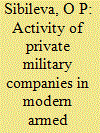

|
|
|
|
|
| Summary/Abstract |
The author considers the present activities of private military companies. Legal assessment of private military companies and their activity is given. Recommendations on legal and organizational work of the state with private military companies are presented.
|
|
|
|
|
|
|
|
|
|
|
|
|
|
|
|
| 2 |
ID:
188312


|
|
|
|
|
| Summary/Abstract |
On the 20 March 2003, George W. Bush launched Operation ‘Iraqi Freedom’. At the time, it was unlikely anyone in his administration envisaged that United States (US) troops would eventually rely on the largest force of private military contractors in recent times. Victory over Saddam Hussein and the ensuing occupation and reconstruction of Iraq would have not happened without the support of military contractors working behind the scenes to ensure that combat troops receive adequate supplies, maintain vehicles and equipment, and protect military bases and convoys. In Afghanistan, the US and the other countries participating in the North Atlantic Treaty Organization (NATO) International Security Assistance Force mission relied on contractors providing logistics and armed security to an even larger extent. The NATO-trained Afghan military itself inherited US dependence on contractors, whose departure from Afghanistan alongside American soldiers was identified as one of the factors underlying Kabul armed forces’ inability to confront the Taliban’s advance.
|
|
|
|
|
|
|
|
|
|
|
|
|
|
|
|
| 3 |
ID:
186331


|
|
|
|
|
| Summary/Abstract |
This article introduces the Commercial Military Actor Database (CMAD), a dataset able to support research on civil war and commercial military actors. First, the CMAD covers all civil wars from 1980 to 2016 across all of the world’s regions except Europe, which enables the investigation of long-term regional and global trends. Second, the CMAD encompasses the corporate market segment and mercenary outfits, which facilitates the analysis of how those actors have impacted conflicts differently. Third, containing detailed information about the relationships behind exchanges, the CMAD allows users to disaggregate market exchanges. Using the CMAD’s new data, we examined trends in the market for force, and demonstrate the data’s added value. We re-examining Akcinaroglu and Radziszewski’s study on how private military and security companies affect the duration of civil war. The findings show that the market’s influence on conflict can only be fully understood by including corporate and mercenary actors.
|
|
|
|
|
|
|
|
|
|
|
|
|
|
|
|
| 4 |
ID:
110916
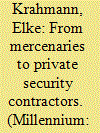

|
|
|
|
|
| Publication |
2012.
|
| Summary/Abstract |
The proliferation of armed security contractors in Iraq and Afghanistan has led to widespread criticism of their insufficient control through international laws and conventions. This article suggests that one reason for this omission has been the (re)construction of actors who provide armed force for profit in international legal discourses. During most of the 20th century, armed persons who participated in foreign conflicts for monetary gain were identified as 'mercenaries'. They were outlawed through international legal documents such as the United Nations (UN) Convention on Mercenarism and given restricted rights in the First Additional Protocol to the Geneva Conventions. Today, the same types of actors are increasingly defined as 'private security contractors', and new discourses and international agreements are emerging that attribute to them legality and legitimacy. The aim of this article is to examine the changing legal constructions of armed security providers since the 1970s and the consequences with respect to their control. The article argues that the (re)construction of actors who supply armed force for money in international legal discourses has been made possible by three main discursive strategies: the distinction between persons and corporations providing armed force for profit, the changing focus from the motivations of these actors to their relationship to a 'responsible command', and the shift from a concern about the actors to one about certain activities.
|
|
|
|
|
|
|
|
|
|
|
|
|
|
|
|
| 5 |
ID:
187677


|
|
|
| 6 |
ID:
188314
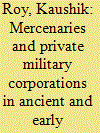

|
|
|
|
|
| Summary/Abstract |
In India, from the time of emergence of empires in circa 300 BCE till the rise of British power in eighteenth century, military mercenaries and private military companies dominated the politico-military landscape. Premodern India had both secular (military guilds) and religious (based on temples and akharas) military corporations. The mercenaries were mostly marginal peasants and demobilised soldiers. They were hired through the agency of their clan leaders, tribal chieftains or the zamindars (large landlords) in whose villages they resided. Historians argue that the presence of the mercenaries and extra state military corporations prevented the rise of strong states in premodern India. In this paper, based mostly on indigenous sources, I argue that the military mercenaries and the private military corporations of pre-British India were at the forefront of technological development. The mercenaries were the channel through which tools, techniques, and ideas of warfare were transferred. The rulers relied on the mercenaries because of their military skills and in the long run they also proved to be cheaper compared to the cost of maintaining permanently a large regular army.
|
|
|
|
|
|
|
|
|
|
|
|
|
|
|
|
| 7 |
ID:
188317
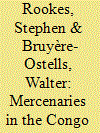

|
|
|
|
|
| Summary/Abstract |
Often maligned by academics and international organisations alike, mercenaries are perceived as being a contributory factor to the worsening of conflict and as a threat to democracy. This chapter demonstrates that this reputation is not wholly deserved, and that in certain cases mercenaries have made a valuable contribution to creating stability in highly unstable contexts. Also, this chapter questions certain interpretations relating to the role and identity of mercenaries. Far from being cold-blooded avaricious killers, we show that there is a range of different reasons why someone becomes a mercenary and argue that the aforementioned categorisation has been used as a political tool.
|
|
|
|
|
|
|
|
|
|
|
|
|
|
|
|
| 8 |
ID:
188313
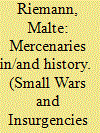

|
|
|
|
|
| Summary/Abstract |
The history of the mercenary seems little less than the history of organized warfare itself. From the dawn of recorded history to the recent rise of Private Military Companies, mercenaries appear as a historical constant that allows scholars to make grand historical claims about the organisation of force within world history. This article cautions against this view, arguing instead that the analysis of this actor has been compromised by the failure to adequately historicise and contextualize the concept of the mercenary due to the uncritical acceptance that mercenaries are a trans-historical occurrence. Informed by a historicist contextual approach, I show how two foundational characteristics of the mercenary concept, a Westphalian understanding of ‘foreignness’ and a modern account of ‘self-interest’, were absent in the periods preceding the 18th century. I demonstrate this absence through an analysis of ‘mercenaries’ in Ancient Greece and the Middle Ages, exposing how the problematization of these actors within their own historical context displays a radical difference if compared to our contemporary understanding of the mercenary. In doing so this article raises awareness to the historical specificity of this seemingly universal concept and cautions against the uncritical backward projection of this concept into the past.
|
|
|
|
|
|
|
|
|
|
|
|
|
|
|
|
| 9 |
ID:
144345
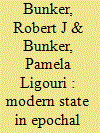

|
|
|
|
|
| Summary/Abstract |
This article is intended to serve as a ‘think piece’ which invites readers to view current perceived changes to the conduct of modern warfare in the broader historical light outlined by proponents of epochal change theory. Neo-medievalists have gone a step in this direction and posited that these changes represent the future of warfare and are evidence of a return, in a sense, to the primary tenets of political and social organization that existed in the period commonly referred to as the Middle Ages. The contention herein is that the answer gains more accuracy if one takes a much longer historical standpoint beginning with classical civilization and moving through the medieval period to our modern world. With regard to the present, this epochal warfare analysis projects that a shift from a Westphalian to post-Westphalian global system is underway. During this period of transition – as in the transition periods between epochs which have preceded it – the dominant state form undergoes a deinstitutionalization process, and war is less about traditional issues of state sovereignty, and instead increasingly over ‘what the new form of social and political organization will be’.
|
|
|
|
|
|
|
|
|
|
|
|
|
|
|
|
| 10 |
ID:
087311
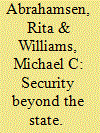

|
|
|
|
|
| Publication |
2009.
|
| Summary/Abstract |
To date, most discussion of security privatization in international politics has been focused on the role of private military companies and mercenaries. This article seeks to shift the focus away from the battlefields and toward the less spectacular privatization and globalization of commercial private security. Drawing on Saskia Sassen's notion of state "disassembly," we situate the growth of private security within broader shifts in global governance. Pointing to the weakness of seeing the rise of private security as an erosion of state power and authority, we show instead a re-articulation of the public/private and global/local distinctions and relationships into what we term "global security assemblages." Analyzing the role of private security in two such assemblages in Sierra Leone and Nigeria, we show how a range of different security agents and normativities interact, cooperate and compete, to produce new institutions, practices and forms of security governance. Global security assemblages thus mark important developments in the relationship between security and the sovereign state, structures of political power and authority, and the operations of global capital.
|
|
|
|
|
|
|
|
|
|
|
|
|
|
|
|
| 11 |
ID:
188316


|
|
|
|
|
| Summary/Abstract |
This article will explore the differing attitudes among British parliamentarians towards the use of German soldiers in 1756 and 1776. Utilising speech act theory, it will be shown that German soldiers were constructed as mercenaries in 1776 because they were being employed to fight against British subjects – the North American colonists. However, when nearly identical German soldiers were employed to fight against a French adversary in 1756, they were not constructed as mercenaries. It will be concluded that the mercenary as a figure of war is not a static, transhistorical concept with universal characteristics. Rather, the mercenary is socially constructed, and, as such, is only made possible in specific historical and socio-political contexts.
|
|
|
|
|
|
|
|
|
|
|
|
|
|
|
|
| 12 |
ID:
093823
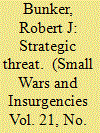

|
|
|
|
|
| Publication |
2010.
|
| Summary/Abstract |
This introductory essay provides a strategic overview of the threat posed by the largest Mexican drug cartels (The Federation, Gulf, Jurez, and Tijuana), and affiliated mercenary groups and street and prison gangs, to the United States. Cartel areas of operation in both Mexico and the United States are highlighted along with linkages to affiliated enforcers and gangs such as Los Zetas, the Mexican Mafia (La Eme), and Mara Salvatrucha (MS-13). The illegal economies of these threat groups - ranging from narcotics trafficking through commodities smuggling and theft, extortion and kidnapping, weapons trafficking, and street taxation - is discussed. The trans-operational environments involving US engagement with the Mexican cartels, mercenaries, and their Sureos affiliates is then characterized. Lastly, individual contributions to this work are summarized.
|
|
|
|
|
|
|
|
|
|
|
|
|
|
|
|
| 13 |
ID:
188319


|
|
|
|
|
| Summary/Abstract |
This article suggests based on the case study of the United Arab Emirates (UAE) that mercenaries as commercial surrogates can become an integral part of an overall effort of military transformation helping regimes in the Middle East to increase military capacity and capability on the battlefield. As the most assertive Arab state post-Arab Spring, the UAE arguably shows the greatest discrepancy between ambitiousness of its strategic objectives and available in-house capacity and capability among states in the region. Consequently, despite its ongoing military transformation, the Emirates more than any other Arab state had to inevitably draw on external surrogates to maintain their military presence in Somalia, Yemen, and Libya. Thereby, the case study of the UAE is quite exceptional in the region, as it has set a new trend for the commercialization of military services at the higher end of the military spectrum when translating capital into military capability and capacity. This in turn confronts Abu Dhabi’s western partners with difficult choices as they rely increasingly on the UAE to bear the burden of conflict in the region.
|
|
|
|
|
|
|
|
|
|
|
|
|
|
|
|
| 14 |
ID:
188315


|
|
|
|
|
| Summary/Abstract |
This article compares two military formats employed in late Medieval Europe. Italian cities contracted out entire military campaigns whereas European monarchies recruited mercenaries in their armies, led by national commanders. How effective were these private armies? When did mercenaries threaten their employers? The article investigates the enterprises of mercenary captains Castracani and Hawkwood in Italy, and mercenaries in France. Private armies were often effective on the battlefield, though public authorities were not always able to control them. Mercenaries’ military strength and governments’ ability to sanction them were decisive for the outcome of these embryonic forms of civil-military relations.
|
|
|
|
|
|
|
|
|
|
|
|
|
|
|
|
|
|
|
|
|